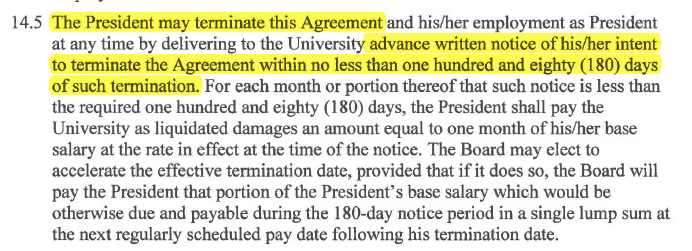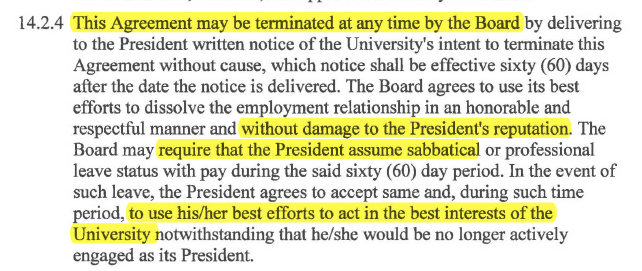President Paul W. Ferguson's original contract, which he signed in Summer 2014, sheds some light on the circumstances of his resignation, giving evidence that the Board of Trustees may have terminated him without cause.
See all of our coverage of Ferguson's resignation.
Did he do something wrong?
Under the original contract, Ferguson could be fired for "moral turpitude," or anything that would bring "public disrespect, contempt or ridicule" to the university, or for any law violations or fraud.
If he were fired for wrongdoing, however, Ferguson would not receive any severance pay.

From his severance agreement, we know that Ferguson will receive around $561,400, more than one year's salary. So it's unlikely he left because of any wrongdoing.
Did he decide to leave on his own?
Ferguson also had the opportunity to terminate the agreement himself, by letting the Board of Trusteesknow 180 days in advance (14.5). In the current situation, however, Ferguson's resignation will be effective in 60 days. In a scenario in which he decides to leave, the contract the Board would only have to pay him for the 180 days, or however long he stayed in office.

If Ferguson decided to resign with less than a 30 day notice (14.6), according to the original contract, the university would not have to pay him after his resignation.


Again, we know that Ferguson will be paid more than one year's salary, so the current situation does not match up with the compensation for resignation in the original contract.
Was he terminated without cause?
Another section of the agreement, (14.2), says the university can terminate the agreement "without cause."
In this situation, the notice from the board would go into effect 60 days later, and the president may have to take a sabbatical in the meantime. (Sound familiar?)

If that happens, the Board has to pay the president one year of the president's annual base salary, paid out over 12 months.

Which, as previously noted, is what is happening per the severance agreement.
Also in the severance agreement is that Ferguson has to try to find other employment. This is in the original contract as well.

This makes it seem unlikely that the resignation (or termination without cause) are due to health reasons, because the president is obligated to look for work.
Why?
Christopher Pearcy, a lawyer with Hume Smith Geddes Green & Simmons LLP, looked at Ferguson's severance agreement for the Daily News and said it could be different scenarios.
"Sometimes the employee actually wants to resign, and the employer asks for this kind of agreement to legally protect them from any possibly future litigation or claims," Pearcy said. "It gives the employer some legal control over what is said and the terms the parties separate under.
"Other times, the employer could be dissatisfied with the employee for some reason and will offer them the chance to resign, rather than terminating them. Resignation in that scenario is typically preferable to both sides because, again, it allows the parties some control over the outcome, what is said about each other, and greatly reduces the risk of future litigation or the release of confidential information."
The contracts share possibilities for the scenarios behind Ferguson's resignation, but still don't answer, "Why?"
We may never know the reason behind the termination, because under the severance agreement, both parties have signed on to confidentiality.
Read more about the confidentiality clause in the severance agreement here.





